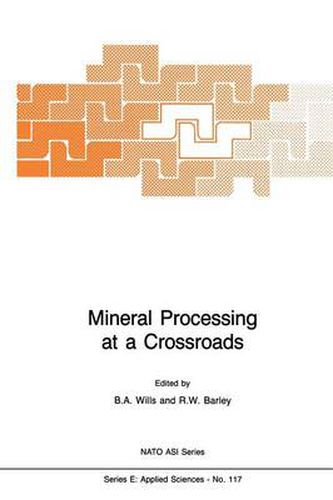Readings Newsletter
Become a Readings Member to make your shopping experience even easier.
Sign in or sign up for free!
You’re not far away from qualifying for FREE standard shipping within Australia
You’ve qualified for FREE standard shipping within Australia
The cart is loading…






This title is printed to order. This book may have been self-published. If so, we cannot guarantee the quality of the content. In the main most books will have gone through the editing process however some may not. We therefore suggest that you be aware of this before ordering this book. If in doubt check either the author or publisher’s details as we are unable to accept any returns unless they are faulty. Please contact us if you have any questions.
Due to the increasingly complex mineralogy, and lower grade of many current ore reserves, technology has, over the past decade, had to evolve rapidly to treat these materials economically in an industry which has undergone severe periods of recession. However, most of the technical innovations, such as the increasing use of solvent-extraction, ion-exchange etc., have been in the field of chemical ore processing, and, apart from the use of computers and ever larger unit process machines, there have been few major evolutionary changes in the field of physical mineral processing, where conventional crushing and grinding methods, essentially unchanged in half a century, are followed by the ‘old-faithfuls’- flotation, gravity, magnetic and electrostatic methods of separation. Many of these techniques have major limitations in the treatment of ‘new’ ores such as complex sulphides, and the main purpose of the NATO Advanced study Institute (ASI)
Mineral Processing at a Crossroads was to review the future of mineral processing. One of the great failings of physical methods is their inability to treat ultra-fine particles, and much research effort is required in this area. Flotation is still the most widely used and researched method for separating minerals, and is the only method which can be used to produce separate concentrates from complex sulphide ores. However, its performance on these ‘modern’ ores is poor, and it is in this area particularly that chemical methods will increasingly be integrated into plant circuits.
$9.00 standard shipping within Australia
FREE standard shipping within Australia for orders over $100.00
Express & International shipping calculated at checkout
This title is printed to order. This book may have been self-published. If so, we cannot guarantee the quality of the content. In the main most books will have gone through the editing process however some may not. We therefore suggest that you be aware of this before ordering this book. If in doubt check either the author or publisher’s details as we are unable to accept any returns unless they are faulty. Please contact us if you have any questions.
Due to the increasingly complex mineralogy, and lower grade of many current ore reserves, technology has, over the past decade, had to evolve rapidly to treat these materials economically in an industry which has undergone severe periods of recession. However, most of the technical innovations, such as the increasing use of solvent-extraction, ion-exchange etc., have been in the field of chemical ore processing, and, apart from the use of computers and ever larger unit process machines, there have been few major evolutionary changes in the field of physical mineral processing, where conventional crushing and grinding methods, essentially unchanged in half a century, are followed by the ‘old-faithfuls’- flotation, gravity, magnetic and electrostatic methods of separation. Many of these techniques have major limitations in the treatment of ‘new’ ores such as complex sulphides, and the main purpose of the NATO Advanced study Institute (ASI)
Mineral Processing at a Crossroads was to review the future of mineral processing. One of the great failings of physical methods is their inability to treat ultra-fine particles, and much research effort is required in this area. Flotation is still the most widely used and researched method for separating minerals, and is the only method which can be used to produce separate concentrates from complex sulphide ores. However, its performance on these ‘modern’ ores is poor, and it is in this area particularly that chemical methods will increasingly be integrated into plant circuits.